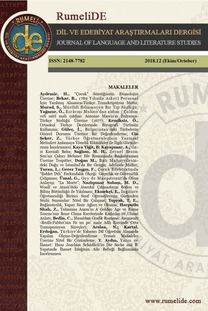Türkçe bir romandaki Marksist feminist söylem ve romanın çevirisinin değerlendirmesinde Eugene Nida’nın “eşdeğerlik” kavramının uygulanması
Marksist feminist kuram, eşdeğerlik, devingen eşdeğerlik, çeviri, Kürk Mantolu Madonna
Marxist feminist discourse in a Turkish novel with Eugene Nida’s concept of “equivalence” applied on translation evaluation of the novel
Marxist feminist theory, equivalence, dynamic equivalence, translation, Madonna in a Fur Coat,
___
- Akatlı, F. (2002). Önsöz. In Sabahattin Ali Kürk mantolu Madonna (2009 edition). 5-8. İstanbul: YKY. Ali, S. (2009). Kürk mantolu Madonna. İstanbul: YKY. Ali, S. (2016). Kürk mantolu Madonna. (M. Freely and A. Dawe, Trans.). London: Penguin Classics. Atkinson, T-G. (2000). Radical feminism. In B. A. Crow (Ed.), Radical feminism: A documentary reader (pp. 82-89). New York and London: NYU Press. Bandarage, A. (1984). Women in development: Liberalism Marxism and Marxist-feminism. Enzymologia, 15(4), 495-515. Barrett, M. (2014). Women's oppression today: The Marxist/feminist encounter. London and New York: Verso. Brunell, L. and Burkett, E. (2019). Feminism. Encyclopædia Britannica. https://www.britannica.com/topic/feminism Retrieved: 09/ 08/2019. Chinn, P. L., and Wheeler, C. E. (1985). Feminism and nursing. Nursing Outlook, 33(2), 74-77. Dickinson, K. (2013). Translating surfaces: A dual critique of modernity in Sabahattin Ali’s Kürk Mantolu Madonna. Transit, 9(1), 2-9. Donovan, J. (2005). Feminist teori, (A. Bora, M. Ağduk Gevrek and F. Sayılan, Trans.), İstanbul: İletişim Yayınları. Earle Ellis, E. (2003). Dynamic equivalence theory, feminist ideology and three recent Bible translations. The Expository Times, 115(1), 7-12. Engels, F. (1979). Ailenin, özel mülkiyetin ve devletin kökeni (K. Somer, Trans.). Ankara: Sol Yayınları. Ferree, M. M. (2006). Globalization and feminism. In M.M. Ferree and A. M. Tripp (Ed.), Global feminism: Transnational women's activism, organizing, and human rights (pp. 3-23). New York and London: New York University Press. Gimenez, M., and Vogel, L. (2005). Marxist-feminist thought today. Science & Society, 69(1), 5-10. Groenhout, R.E. (2002). Essentialist challenges to liberal feminism. Social Theory and Practice 28(1), 51-75. Hartmann, H. (2012). Marxsizmle feminizmin mutsuz evliliği. In G. A. Savran and N. T. Demiryontan (Ed.), Kadının görünmeyen emeği (pp. 157-206). İstanbul: Yordam Kitap Yayınlar. Işık, E. (1998). Beden ve toplum kuramı. İstanbul: Bağlam Yayıncılık. Karaca, A. (1993). Sabahattin Ali'nin öykülerinde toplumsal konular. Türkoloji Dergisi, 11(1), 221-232. Kolodny, A. (1975). Some notes on defining a "feminist literary criticism". Critical Inquiry, 2(1), 75-92. Kolodny, A. (1980). Dancing through the minefield: Some observations on the theory, practice and politics of a feminist literary criticism. Feminist Studies, 6(1), 1-25. Marx, K. (2011). Kapital. (Volume I). (M. Selik and N. Satlıgan, Trans.). İstanbul: Yordam Kitap. Michel, A. (1995). Feminizm. (Ş. Tekeli, Trans.). İstanbul: İletişim Yayınları. Moran, B. (2017). Edebiyat kuramları ve eleştiri. İstanbul: İletişim Yayınları. Nida, E. (2000). Principles of correspondence. In L. Venuti (Ed.), The translation studies reader (pp. 126-140). London and New York: Routledge. Oxford Online Dictionary. https://www.oxfordlearnersdictionaries.com/definition/english/feminism?q=feminism. Retrieved 09/08/2019. Plain, G. (2007). Introduction to part I. In G. Plain and S. Sellers (Ed.), A history of feminist literary criticism (pp. 6-10). New York: Cambridge University Press. Sevim, A. (2005). Feminizm. İstanbul: İnsan Yayınları. Shakernia, S. (2013). Study of Nida’s (formal and dynamic equivalence) and Newmark’s (semantic and communicative translation) translating theories on two short stories. Merit Research Journal of Education and Review, 2(1), 1-7. Shulman, A. K. (1980). Sex and power: Sexual bases of radical feminism. Signs: Journal of Women in Culture and Society, 5(4), 590-604. Snell, M. (1979). The equal pay and sex discrimination acts: Their impact in the workplace. Feminist Review, 1(1), 37-57. Weeks, J. (2011). Un-/Re-productive maternal labor: Marxist feminism and chapter fifteen of Marx's capital. Rethinking Marxism, 23(1), 31-40.
- ISSN: 2148-7782
- Yayın Aralığı: 6
- Başlangıç: 2014
- Yayıncı: Yakup YILMAZ
Etkinliklerle çocuk edebiyatı yapıtlarının Türkçe öğretiminde kullanılması
Yazın çevirisi incelemelerinde yorumlayıcı çeviri kuramı
Türkçe ve Fransızca yazışma metinlerinin çeviri yönünden incelenmesi
Türk mutfak kültürünün şiire yansıması bağlamında Ravzî’nin pilav kasidesi
Kültürel terminoloji çeviri kapsamında nasıl ele alınıyor? Binboğalar Efsanesi
Kavramsal metafor kuramı ve belagat: karşılaştırmalı bir inceleme
Ahmet Naim ÇİÇEKLER, Timur AYDIN
Edirne Valisi Ahmed İzzet Paşa Divançesi
Harnâme’nin yapı unsurları ve muhteva bakımından incelenmesi
Şairi bilinmeyen bir Siroz şehrengizi
Âşûrâ Vak‘ası ve Hz. Hüseyin'in (as) kıyamının Fars şiirine etkisi: Safevî’den günümüze
